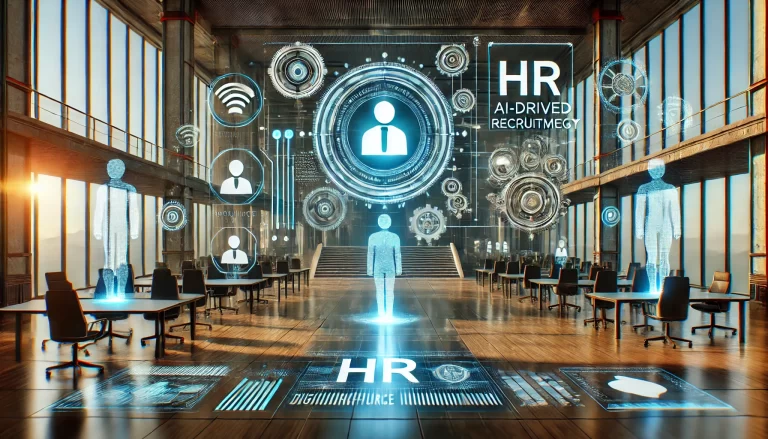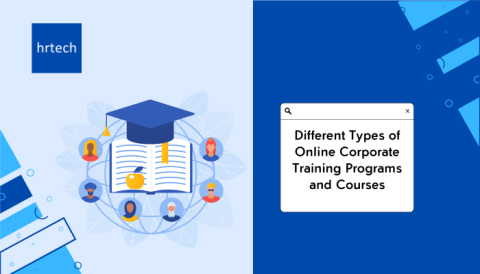Forget the dusty filing cabinets and endless phone calls. The way we recruit talent is undergoing a digital revolution, and 2025 promises to be a year of groundbreaking change.
Imagine a world where resumes are relics of the past, replaced by dynamic profiles showcasing a candidate’s skills in real-time. Where AI whizzes through applications, pinpointing the perfect fit faster than ever before.
Gone are the days of endless paperwork and sifting through physical resumes. In 2025, we’ll see a continued surge in digital recruitment tools. With AI’s aid, Applicant tracking systems automate repetitive tasks, yet human expertise plays a vital role in final hiring decisions.
A study found that 90% of recruiters are already using some form of applicant tracking system, highlighting the growing importance of technology in the hiring process.
But technology isn’t just about efficiency – it’s also about creating a positive candidate experience. Interactive platforms, video interviews, and personalized communication will become the norm, ensuring a smooth and engaging journey for top talent.
This isn’t some futuristic fantasy – this is the reality shaping the hiring landscape right now. Feeling overwhelmed by the whirlwind of change? This blog is your one-stop shop for navigating the top talent acquisition and hiring trends for 2025.
We’ll equip you with the knowledge and strategies to attract and retain the best talent in a competitive market, even if robots start stealing your job (not really, but stay tuned!).
Hybrid Work Model- Evolving Preferences:

Remember the mad scramble to set up home offices in 2020? The rise of remote work seemed like a permanent shift, but hold on a sec. Are things changing again? Recent news headlines might have you wondering if sweatpants and kitchen table conference calls are a thing of the past.
Let’s unpack this together.
We’ve all seen articles about big companies returning their employees to the office. This could be due to concerns about collaboration, sparking innovation, or simply maintaining that special company vibe that’s hard to replicate virtually. But does this mean the dream of flexibility is dead? Not necessarily!
The future of work might involve a hybrid approach, with a mix of in-office and remote work. The good news is that there’s also a growing movement for legal change. Several countries are considering legislation giving employees the right to request flexible work arrangements. This could be a game-changer for employers and employees, offering more control over work schedules and potentially leading to a happier, more productive workforce.
So, what does this all mean for you? Stay tuned! We’ll keep you updated on the latest developments in flexible work legislation and how it might impact the future of the hybrid work model. After all, navigating this evolving landscape is much easier when we do it together!
Recruiting Automation and AI Integration:
Ever feel like there just aren’t enough hours in the day to sift through endless resumes? Obviously! Recruiting teams increasingly turn to automation tools to streamline the process and free up their time for more strategic tasks.
This isn’t just about efficiency, though. Automation can also be a powerful tool for improving your recruitment metrics. Imagine being able to automatically screen resumes for keywords and skills, schedule interviews with a single click, or even personalize candidate communication. Sounds pretty good, right?
But wait, there’s more! The world of Artificial Intelligence is rapidly transforming HR practices. Generative AI, or GenAI for short, is making waves in the recruitment industry. Imagine AI that can create realistic job descriptions, personalize candidate outreach emails, or even conduct pre-screening interviews. While these technologies are still evolving, they have the potential to revolutionize the way we attract and hire top talent.
Transforming HR through Agile Workforce Solutions
Building A Stronger Team:

In today’s globalized world, building a diverse and inclusive workforce isn’t just a buzzword – it’s a strategic advantage. Companies worldwide recognise the power of a talent pool that reflects the rich tapestry of cultures, backgrounds, and experiences.
Here’s why diversity and inclusion (D&I) should be at the forefront of your recruitment strategy:
1. Global Recognition of a Diverse Workforce’s Benefits:
Research consistently shows that companies with a diverse workforce outperform their less diverse counterparts. Benefits include increased creativity, innovation, problem-solving abilities, and brand reputation. A team with a broader range of perspectives can better understand and cater to the needs of a global marketplace.
A study found that companies with a diverse leadership team were 19% more likely to achieve above-average profits.
2. Changes Expected in Tracking Diversity Metrics by Recruiters:
As the importance of D&I grows, expect to see changes in how companies track diversity metrics. Going beyond simple demographics, organizations might start focusing on factors like neurodiversity, socioeconomic backgrounds, and work styles. This will require a more nuanced and data-driven approach to talent acquisition.
Redefining Talent- Rise of Skills-Based Hiring:
Gone are the days when a fancy job title or a specific degree was the golden ticket to landing your dream job. The future of recruitment is all about skills-based hiring, and here’s why it matters:
1. Shift Towards Skills-Based Hiring Criteria: Traditionally, resumes were crammed with past job titles and education, but what about actual skills? The hiring landscape is shifting towards focusing on the specific skills and competencies needed for the role. This allows employers to identify the best fit regardless of their educational background or previous job titles.
Think about it this way: Someone with a degree in English Literature might possess exceptional data analysis skills gained through personal projects. Skills-based hiring allows these hidden gems to shine!
2. Technology Advancements Enabling Skills-Based Hiring: The rise of technology platforms and online assessments makes skills-based hiring a reality. These tools can objectively measure a candidate’s proficiency in various skills, providing valuable data beyond the traditional resume.
For example: hrtech Marketplace offers skill assessment tools to evaluate candidates’ coding abilities, design thinking skills, or project management expertise.
3. Employers Focusing on Skills Over Degrees: Forward-thinking companies recognise that a degree doesn’t always guarantee the necessary skillset for the job. By prioritizing skills-based hiring, they open up their talent pool to a wider range of qualified candidates, fostering a more diverse and innovative workforce.
Would you rather hire someone with a prestigious degree but limited practical skills, or someone who has demonstrably mastered the skills required for the job? The answer is becoming increasingly clear.
Investing in Your People- Internal Mobility and Career Development:
Keeping your top talent happy and engaged isn’t just about offering competitive salaries and benefits. Investing in your employee’s career development is crucial for retention and building a loyal workforce.
Here’s why internal mobility, combined with skills-based development, is a winning strategy:
Employees who feel valued and have growth opportunities are likelier to stick around. Offering internal mobility programs allows employees to develop new skills and pursue career paths within your company, boosting morale and reducing costly turnover.
A study found that companies with strong internal mobility programs experience a 15% lower turnover rate.
Technology can be a powerful tool for facilitating internal mobility. Skills-based assessment platforms offered by HR Tech Marketplace can help identify employees with the potential to excel in different roles within your organization.
Imagine this:
An employee who seems perfect for a new position might not have the specific job title on their resume. Skills-based assessments can reveal hidden talents and allow you to promote from within, fostering a culture of growth and opportunity.
Even the best programs won’t succeed without the right company culture. Transparency, open communication, and a willingness to invest in employee development are essential for a thriving internal mobility program.
Here’s a question to consider: Does your company culture encourage and support employees who want to explore new opportunities within the organization?
Decoding the Next Generation- Adapting to the New Workforce:
How we work is constantly evolving, and the workforce’s expectations are also changing. Gen Z and Millennials are entering the job market with unique priorities and preferences.
Gen Z values transparency, authenticity, and a purpose-driven work environment. They expect a smooth and efficient recruitment process, with clear communication and a focus on skills over traditional resumes.
A study revealed that Gen Z job seekers consider a company’s social responsibility when applying for a position.
Modernize your recruitment process! Utilize social media platforms where Gen Z and Millennials are active. Showcase your company culture through authentic videos and employee testimonials. Focus on the role’s impact and purpose and highlight opportunities for growth and development.
By understanding the evolving trends in talent acquisition and adapting your strategies accordingly, you can stay ahead of the curve and attract the best talent for your organization.
Embracing the Future- Digitalization and Advanced Technologies:
Paper resumes might become a relic of the past. Imagine a future where the entire hiring process, from onboarding to application, is completely digital. This can streamline the process, reduce administrative burden, and improve the candidate experience.
Artificial intelligence (AI) is poised to revolutionize talent acquisition. Advanced algorithms can analyze vast amounts of data to identify the perfect fit for a position based on skills, experience, and cultural fit.
Think about the possibilities:
AI could analyze a candidate’s social media presence or online portfolios to uncover hidden talents and potential.
AI can be a powerful tool for enhancing various aspects of recruiting. Imagine AI-powered chatbots answering basic interview questions, pre-screening resumes for relevant skills, or even conducting initial video interviews. This would free up valuable time for recruiters to focus on building relationships with top talent.
Future of Work- Redefining Flexibility:
The concept of a traditional 9-to-5 workday is evolving. The future of work revolves around flexibility and catering to the needs of a diverse workforce.
Here’s what you can expect in terms of future work arrangements:
1. Expectation of a Combination of On-Site, Hybrid, and Remote Work Models:
The hybrid work model, with a mix of in-office and remote work, is likely to become the norm. Employees will increasingly expect flexibility in their work arrangements, allowing them to create a work-life balance that suits them.
2. Continued Preference for Remote Work and Flexible Schedules:
The COVID-19 pandemic has demonstrated the viability of remote work. Many employees now prioritize flexibility and the benefits of working remotely. Companies that offer flexible work arrangements will be better positioned to attract and retain top talent.
By embracing digitalization, advanced technologies, and flexible work arrangements, you can future-proof your talent acquisition strategy and build a thriving workforce for future years.
Building Your Employer Brand and Prioritizing the Candidate Journey:
Your employer brand is your reputation as a workplace. A strong employer brand that showcases your company culture, values, and commitment to employee development will be a magnet for top talent.
A study found that 86% of job seekers consider a company’s employer brand when deciding to apply for a position.
The candidate experience doesn’t begin with the application and ends with the interview. Every touchpoint matters From when someone interacts with your company website to the onboarding process. Strive for transparency, clear communication, and a smooth application process to leave a lasting positive impression.
Imagine this: A candidate has a great interview but never hears back from your company. This can damage your employer’s brand and deter future applicants. Prioritizing a positive candidate experience at every stage is essential.
Future of Talent Acquisition:
The landscape of talent acquisition is constantly evolving. By staying informed of these key trends and adapting your strategies accordingly, you can position yourself to attract and retain the best talent in 2025 and beyond:
Embrace Automation and AI: Utilize technology to streamline processes, free up valuable time, and make data-driven hiring decisions. Prioritize Diversity and Inclusion: Build a diverse and inclusive workforce to foster innovation and unlock the full potential of your talent pool.
Focus on Skills-Based Hiring: Move beyond traditional resumes and prioritize the skills and competencies needed for the role. Invest in Internal Mobility: Offer opportunities for career development and growth within your organization to retain top talent.
Adapt to the New Generation Workforce: Understand the needs and preferences of Gen Z and Millennials when crafting your recruitment strategy. Embrace Digitalization and Advanced Technologies: Leverage technology to streamline processes and enhance your recruitment efforts.
Build a Strong Employer Brand: Showcase your company culture, values, and commitment to employees to attract top talent. Prioritize the Candidate Experience: Create a smooth, transparent, and positive experience for all applicants.
The future of work is exciting! By staying proactive and adapting to these crucial trends in talent acquisition, you can create a winning strategy for building a thriving workforce in the years to come.
Conclusion:
The world of recruitment is undergoing a digital revolution, and 2025 promises to be a year of exciting change. From AI-powered hiring to a focus on skills over degrees, these key trends will reshape how we attract and retain top talent:
Automation & AI: Streamline processes and free up time for strategic initiatives.
Diversity & Inclusion: Build a stronger, more innovative workforce.
Skills-Based Hiring: Find the perfect fit based on actual skills, not just resumes.
Internal Mobility: Invest in your people and provide growth opportunities.
The New Workforce: Adapt your strategy to attract Gen Z and Millennials.
Digitalization: Leverage technology to enhance every aspect of recruiting.
Employer Branding: Showcase your company culture and attract the best talent.
Candidate Experience: Make every touchpoint positive and transparent.
Ready to stay ahead of the curve? Download our free eBook, read blogs, resources and discover how to adapt your recruitment strategies for the future of work!





